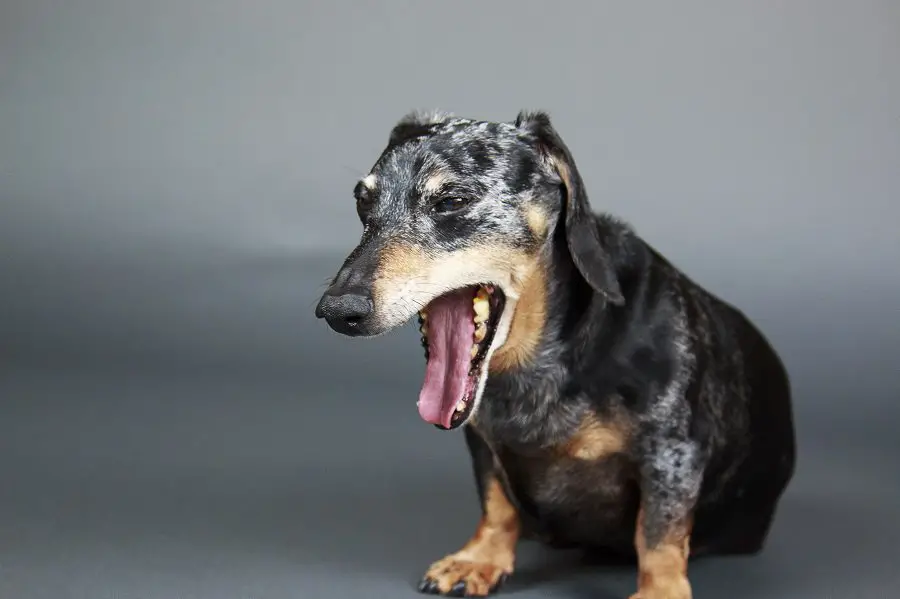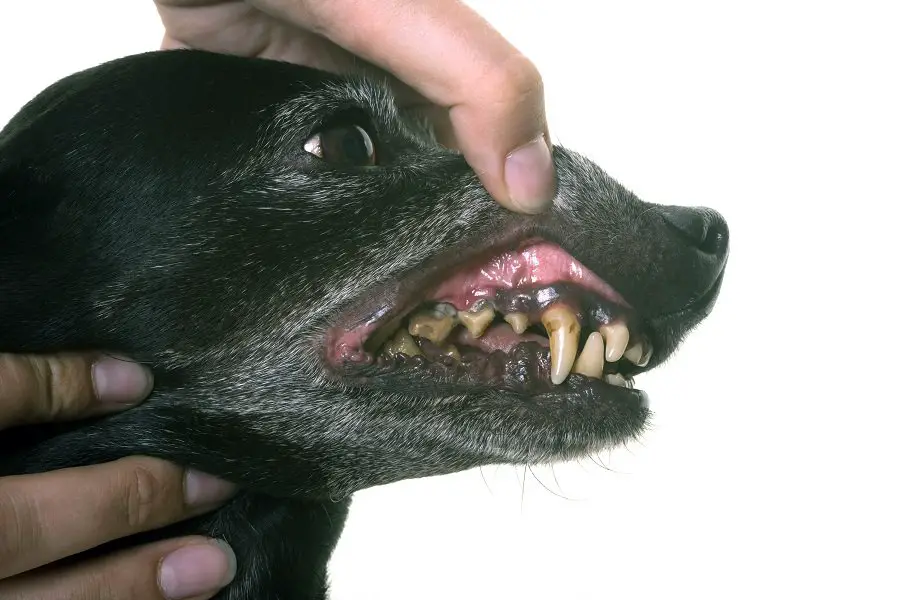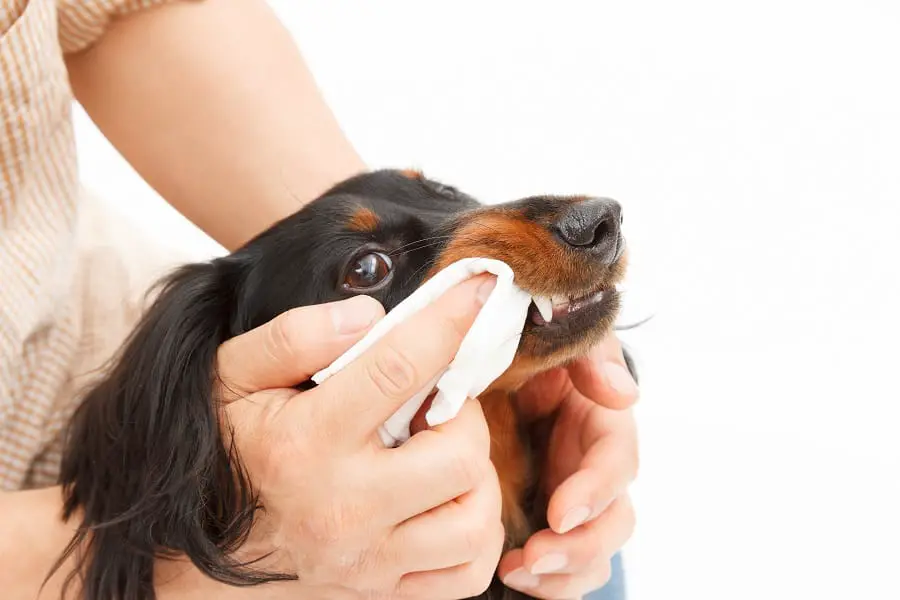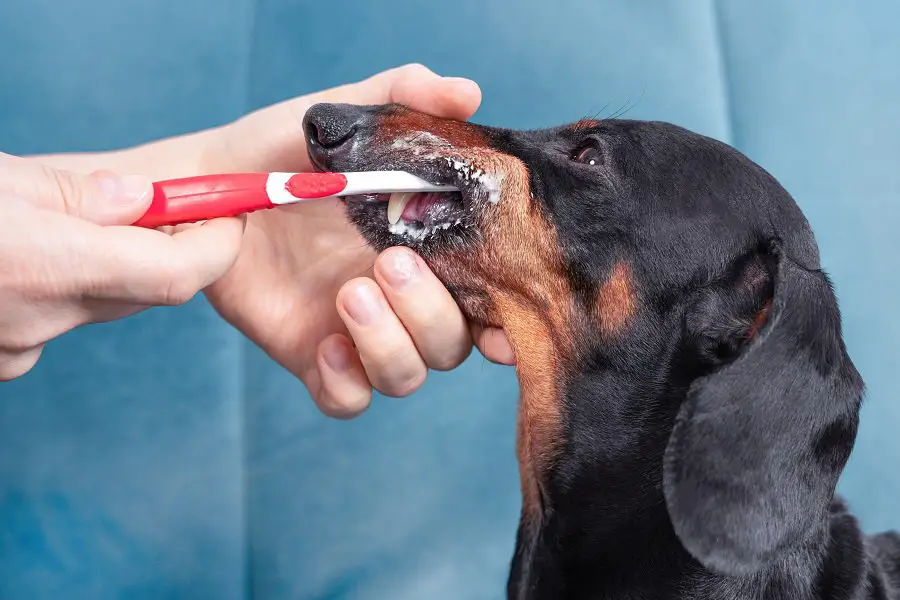Dachshund lovers are often found exchanging notes on how to get rid of the horrible smell coming out of the mouths of these (otherwise) adorable creatures.
And it is very likely that you are familiar with the experience of holding your own breath when your loving dachshund decides to plant a kiss on your face (as it is often wont to).
Is bad breath in dogs normal? Or are dachshunds especially prone to the curse of halitosis – a price paid, as it were, for their cuteness, intelligence and fearless nature?
Is there a way to keep your dog’s breath mint-fresh?

Many dog owners assume that their pet’s bad breath is one of those things that you need to reconcile to in return for the dollops of love, companionship and fun these animals provide you.
But, as is the case with humans, bad breath in dogs always has an underlying cause.
This could be related to oral hygiene or a bigger health issue, or just something smelly that keeps finding its way to your dog’s mouth.
Dachshunds, like some other small breeds, are definitely more likely to suffer from halitosis – we will tell you why.
And, yes, there are ways to decipher the causes, find a long-term cure and even prevent bad breath from occurring in the first place.
Bad Breath in Dachshunds
Dachshunds have been lucky to be saved from the typical dog smell that you would find in many other breeds. You win some, you lose some, though.
In exchange for having a generally pleasant smell, dachshunds have been cursed with being more prone to bad breath than other breeds.
While the main reason for this is the breed’s physiology, certain traits related to the temperament of these dogs can also be blamed for it.
Like many small dog breeds, adult dachshunds have to fit in their 42 teeth in a small mouth. This crowding of teeth can lead to dental issues.
Some of the baby teeth in dachshunds also do not fall off naturally as the dogs grow up. This can cause issues in adulthood.
Another cause that often goes unnoticed is excessive panting.
Dachshunds are small breeds, but love to try and match their human companions or larger dogs in physical activity.
They can’t always keep up, of course, and the resulting open mouth panting can be a cause for bad breath.
If you are familiar with the breed, you would also be familiar with its love for food.
Moments after gobbling down a heavy meal, a dachshund will start looking expectantly at you for its share in whatever you are eating.
Even if you are not eating in front of it, the dog’s sharp sense of smell will alert it of food being unpacked in a distant part of the house and it will come begging.
Despite knowing better, those eyes will force you to give in and hand over a bite.
This frequent eating and the high likelihood of unhealthy food finding its way into the dog’s digestive system make it even more likely to develop bad breath.
Finally, the dog’s propensity for exploration and hunting ensure it will always work out new ways to access disgusting, smelly things.
Causes of Bad Breath
The most common cause of bad breath in dachshunds, or dogs in general, is disease of the teeth and/or gums.
Dachshunds are particularly prone to plaque buildup, with leftover food and irregular cleaning of teeth being the main culprits.
The bacteria carried by plaque can cause tooth decay, gum disease and foul breath.
If plaque is not removed regularly, it hardens into tartar, which requires measures more serious than brushing to cure.

A related problem is gingivitis, which affects the gums and can progress to periodontitis, if left untreated.
The bacteria from decaying teeth can enter the bloodstream and easily reach internal organs.
So, while pain, bleeding and tooth loss are the obvious results, there are studies that link periodontal disease to even greater complications related to the heart, liver and kidneys.
Apart from poor dental hygiene, there can be other issues that manifest in the form of bad breath.
For instance, if your dachshund’s breath smells like urine or ammonia, it could be a symptom of kidney disease.
A strong, fruity smell could be an indication of diabetes, especially if the dog also displays related behavior like excessive thirst and frequent urination.
If the liver is damaged, it can result in a particularly foul odor from the mouth, accompanied by other symptoms like loss in appetite, vomiting, and a yellow tinge in the corneas and gums.
Certain respiratory problems and gastrointestinal issues can also be the underlying causes for persistent bad breath.
All of this means that it is not just your own discomfort with the bad smell that is an issue here, but the possible existence of one or more serious ailments in the dog itself, some of which can assume life-threatening proportions if not discovered early on.
The kind of food you provide to your dog also has a bearing on how its breath smells. The same food product can react in vastly different ways with different dogs.
Doing your research and consulting a vet to fix a healthy and strict diet for your dachshund is important.
Equally important is to keep yourself from letting it have a share from the food you eat.
Licking of anal glands can also be a cause for bad breath in dogs, but it is less likely in dachshunds given their long bodies, which makes it difficult for the mouth to reach the posterior.
Treatment
If you notice persistent bad breath or any visible signs of discomfort related to your pet’s teeth, take it to a reliable vet as soon as possible.
He will perform a physical examination, and recommend laboratory tests, to diagnose the specific problem.
Plaque is the culprit in most cases, which requires professional dental cleaning. An X-ray might be needed to determine if the dog suffers from gum disease.
The seriousness of the disease will have a bearing on the treatment suggested by the vet.
A blood screening might also be conducted to rule out complications like liver or kidney damage.
If one or more teeth are too far gone, they might have to be pulled out to prevent spreading of the problem. He might also suggest some changes in the dog’s diet, if required.
Prevention
Being aware that a dachshund is more likely to develop dental issues is the first step in combating this, often overlooked, problem.

It is advisable to examine your dog’s teeth periodically right from its early days with you as a pup – apart from helping you notice the onset of dental problems, it will also make the dog more comfortable with people touching its teeth.
There are a number of active preventive measures you can adopt:
-Brush your dachshund’s teeth daily. We have covered some important points to remember when brushing its teeth in the next section.
-Ensure that your dachshund has an appropriate, healthy diet. The food you provide it should be of a high quality and easy to digest.
-Avoid sharing food scraps off the dining table with your dog. Minimize its sugar intake.
-Buy safe chew toys for your dog. The natural process of chewing helps keep the teeth clean.
-Keep a tab on what your dog chews on when it is outside. Eating or chewing on stones, for example, can lead to cracks in the teeth. These cracks are breeding grounds for bacteria.
-Take your dog to a vet for regular checkups – this also helps keep at bay any non-dental causes that might result in halitosis. During these visits, ensure that the vet examines your dog’s teeth properly.
There are a number of treats available in the market for improving a dog’s breath odor.
These are, of course, meant to mask the breath and will not address the underlying cause if your dog does suffer from tooth decay.
Conduct your own research to find out what works best for your dog, and consult your vet too for ideas on these or other home-made products.
Teeth Cleaning for Dachshunds
While brushing teeth once or twice a week works for larger dogs, for dachshunds, a daily regimen is suggested.
This is the most effective way to prevent (and stop) plaque buildup, so you and your dog need to labor through this, initially annoying, process.
Here are a few important pointers to keep in mind in this regard:
Never use regular toothpaste used by humans to brush your dog’s teeth. The chemicals in regular toothpaste can be very harmful to a dog if ingested.
Special enzymatic toothpaste for pets is commonly available, which is safer, more effective in eliminating bacteria and comes in flavors (like chicken) that your dog will like.

There are also special toothbrushes for dogs. One looks very similar to human toothbrushes, but has a slightly longer handle.
The other has little bristles and is placed over your finger for cleaning. You can choose either depending on your comfort.
Most dogs will hate you for poking into their mouths, so you will face difficulty initially.
But, with time, your dog will get used to it, and you will also figure out ways to complete the task without causing discomfort to your pet.
Brushing the dog’s teeth when it is relaxed is a good idea. The period immediately after the dog’s daily walk is an ideal time.
At the beginning, just focus on the dog’s front teeth, instead of the entire mouth all at once.
As the dog becomes more comfortable with the process, you can expand the area you are covering within its mouth.
The right way to brush a dog’s teeth is by placing the brush at an angle of 45 degrees against the teeth, and making downward and circular motions.
Once your dog has become comfortable with the act of teeth brushing, ensure that its canine and back teeth are brushed properly, but gently.
Do not forget the inside of the teeth either, which can be a particularly tricky spot to get to.
Do not get concerned if there’s light bleeding while brushing your dog’s teeth. But if the bleeding is frequent or in large volumes, take the dog to a vet immediately.
This daily brushing has to be complemented with professional brushing once in 6 to 12 months.
After your first visit for a dental checkup, you can consult with them to fix a schedule.
Your dachshund’s teeth deserve almost as much care as you accord your own (though the dog might put its paw down if you decide to subject it to flossing).
Once you have these basics down pat, the chances of your dachshund developing halitosis will come down drastically.
Which means you won’t have to brace yourself every time it comes towards your face to give it a licking.
More importantly, this will keep your dog from losing its teeth or developing any related health hazards later on.
